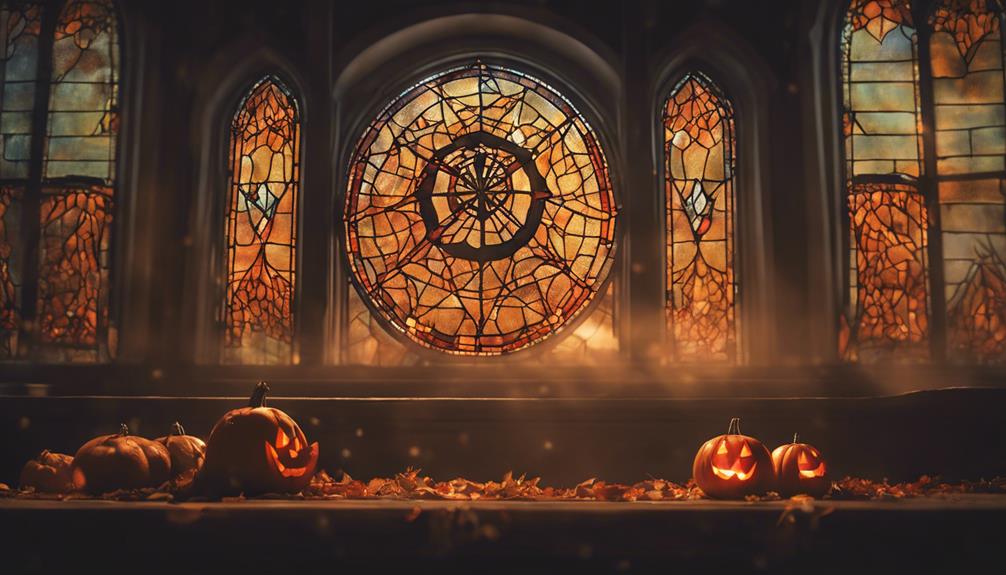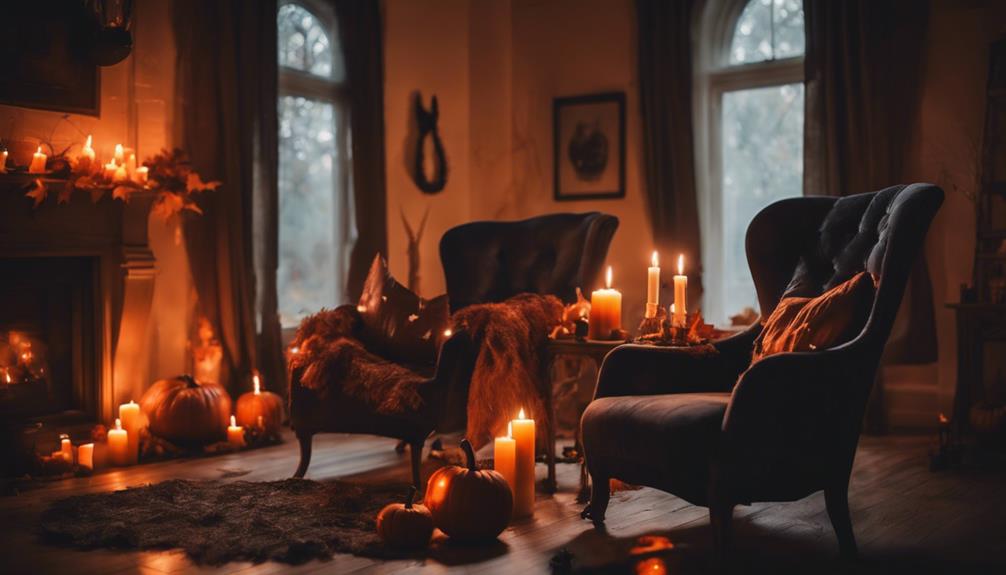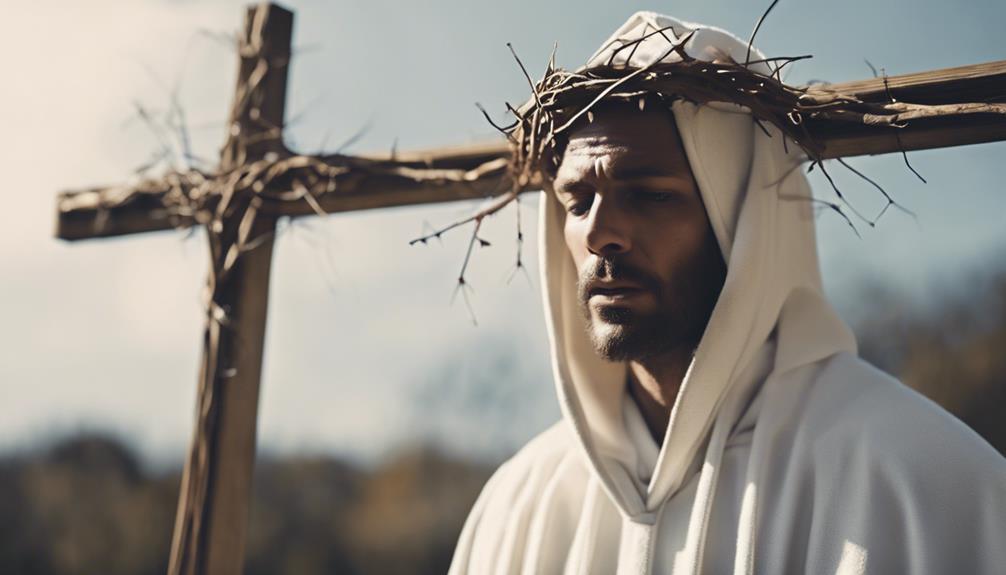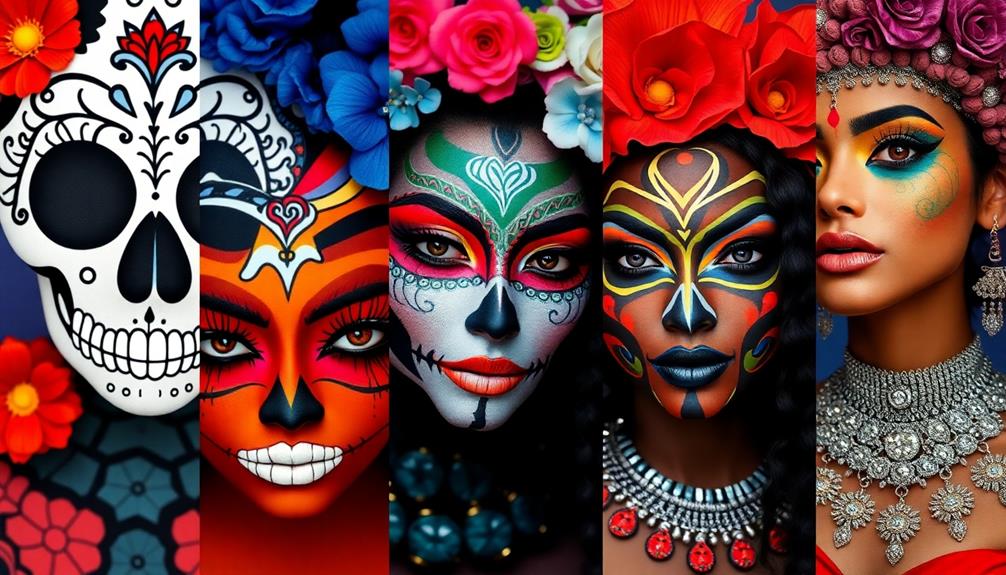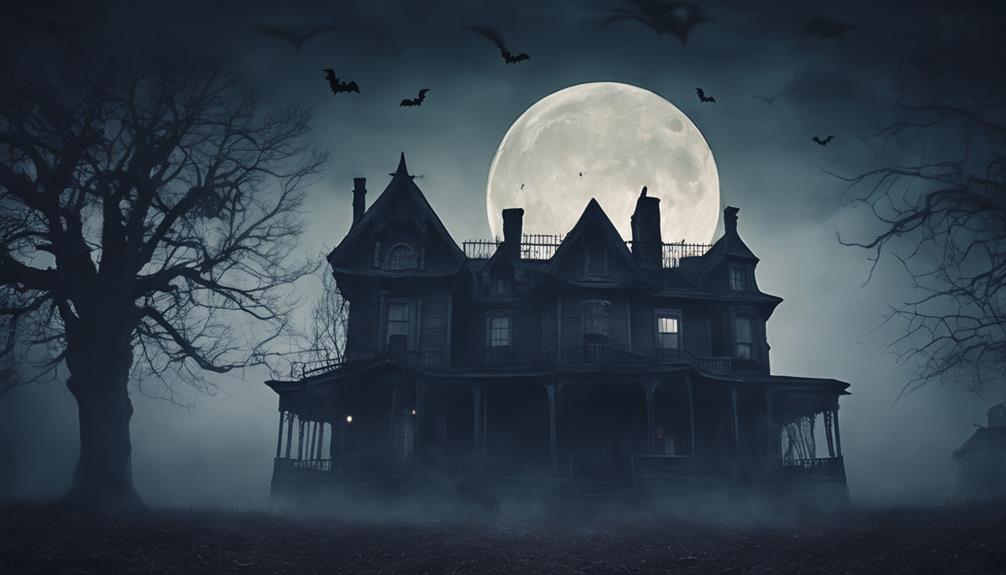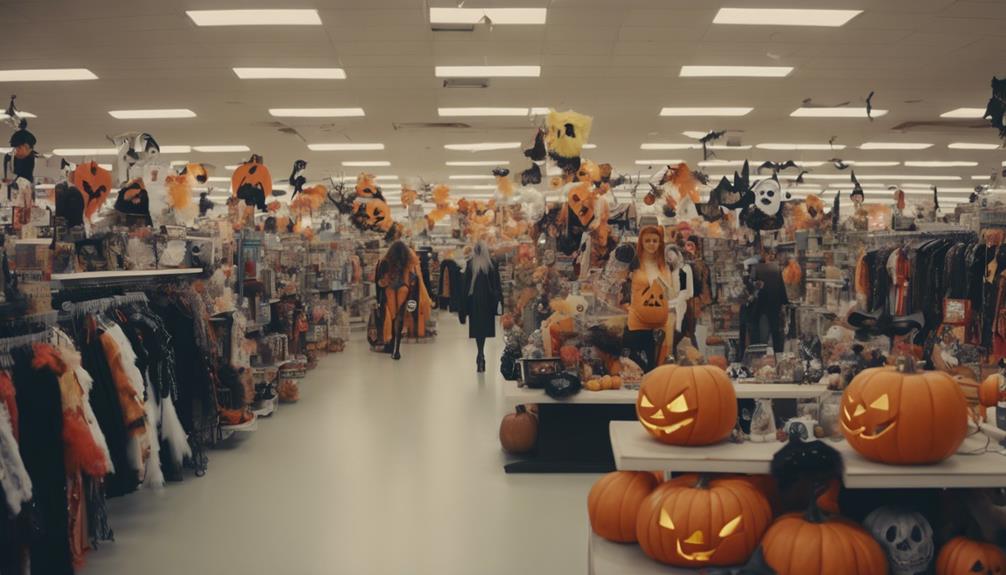As a Baptist, you may wonder if celebrating Halloween is compatible with your Christian values. The holiday has pagan roots, but many modern traditions have been secularized. Some Baptists view Halloween as incompatible with Christian values, while others see it as a harmless celebration. You must weigh the pros and cons, considering your faith priorities. You can choose to celebrate in a way that honors God, or opt for alternative activities that align with your beliefs. Remember, your decision should be guided by your personal convictions and commitment to God. Continue exploring to understand the complexities and nuances surrounding Baptists and Halloween celebrations.
Key Takeaways
• Baptists can celebrate Halloween, but some view it as incompatible with Christian values due to its pagan roots and occult associations.
• Baptist families should weigh the pros and cons, considering their faith values and priorities when deciding whether to celebrate Halloween.
• Participating in alternative activities, such as fall festivals or service projects, can be a fun and faith-focused way to celebrate the season.
• Celebrating Reformation Day on October 31st is an alternative way to honor Christian saints and martyrs, aligning with Baptist values.
• Ultimately, the decision to celebrate Halloween is a personal one, influenced by individual convictions and interpretations of scripture.
Historical Origins of Halloween
Halloween, a holiday often associated with witches, goblins, and superheroes, has its roots in the ancient Celtic festival of Samhain.
This festival marked the end of the harvest season and the beginning of the darker half of the year, which the Celts believed was a time when the boundary between the living and the dead became blurred.
The Celts believed that on Samhain, spirits of the dead returned to the world of the living, and that the druids would light bonfires and wear costumes to ward off any malevolent spirits.
As Christianity spread throughout Europe, the early Christian church attempted to eliminate the pagan traditions of the Celts and other cultures.
In the 7th century, Pope Boniface IV designated November 1st as All Saints' Day, a day to honor all Christian saints and martyrs.
The evening before All Saints' Day became known as Hallows Eve, which was later shortened to Halloween.
Despite its origins in ancient pagan traditions, Halloween has evolved over time to become a holiday celebrated by people of many different faiths and cultures.
Baptist Views on Pagan Practices
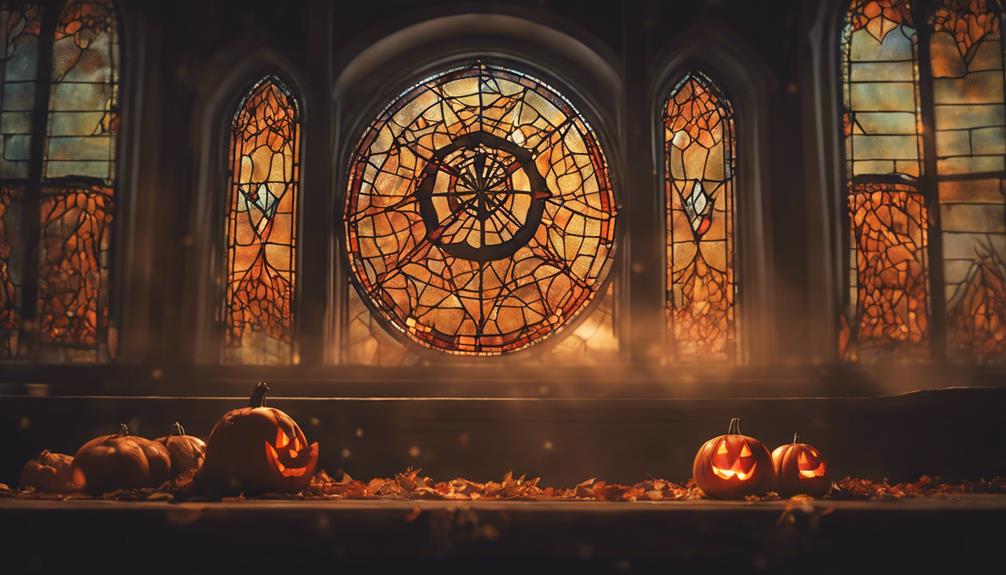
As Baptists reflect on the historical origins of Halloween, they're faced with the question of whether to participate in a celebration that has roots in pagan practices.
You're likely wondering, 'What's the big deal about pagan practices?' In the Baptist church, the idea of engaging with pagan practices can be a sensitive topic.
Some Baptists view pagan practices as incompatible with Christian values, seeing them as a form of idolatry. Others take a more nuanced approach, recognizing that many modern Halloween traditions have been secularized and stripped of their original pagan meanings.
You might be thinking, 'But what about the cultural significance of Halloween?' That's a valid question. While some Baptists argue that participating in Halloween celebrations is a way to connect with the broader culture, others see it as a compromise of their faith.
Ultimately, the decision to celebrate Halloween is a personal one, influenced by individual convictions and interpretations of scripture. As a Baptist, you'll need to weigh the pros and cons, considering your own faith values and priorities.
Pagan Roots of Halloween Traditions
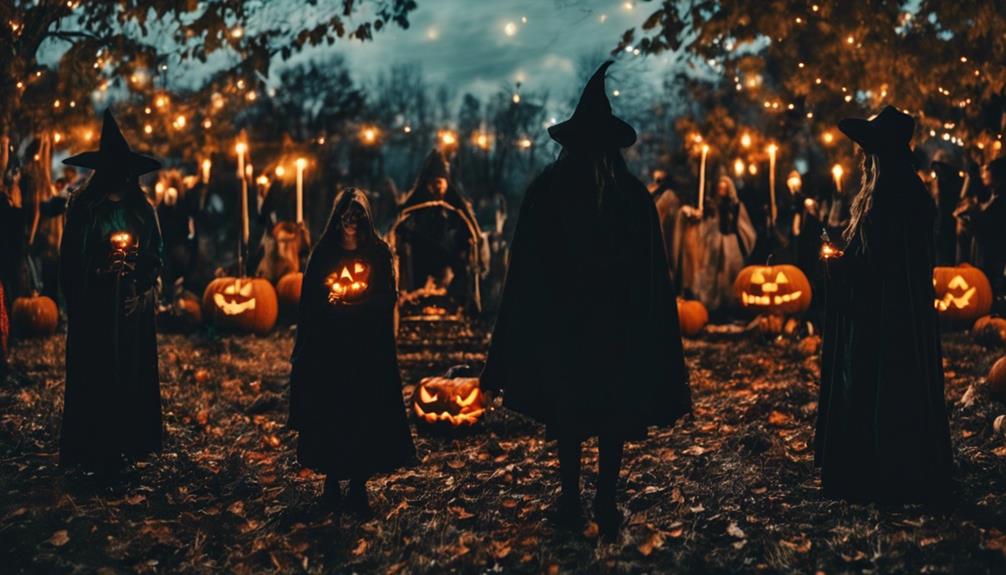
As you explore the history of Halloween, you'll discover that this modern celebration has roots in ancient pagan traditions.
The Celtic festival of Samhain, which marked the end of the harvest season, is believed to be the origin of modern-day Halloween celebrations.
You'll find that many of the traditions and symbols associated with Halloween today, such as dressing up in costumes and carving jack-o'-lanterns, have their origins in these ancient pagan rituals.
Samhain Origins Uncovered
Nearly 2,000 years before the first jack-o'-lantern was carved, the ancient Celtic festival of Samhain marked the beginning of winter, signaling a time when the veil between the living and the dead was at its thinnest.
You might be surprised to learn that Samhain, pronounced 'sah-win,' was a significant event in the Celtic calendar. It fell on November 1st, which is now associated with All Saints' Day.
During Samhain, the Celts believed that the boundary between the living and the dead became blurred, allowing spirits to return to the world of the living. This supernatural crossover was both fascinating and unsettling for the ancient Celts.
They believed that on Samhain, spirits of the dead would return to their homes, seeking hospitality and food. In response, the Celts would leave food and drink offerings for these spirits, hoping to appease them and avoid any malevolent interactions.
As you explore the origins of Halloween, understanding the significance of Samhain is crucial to grasping the evolution of this holiday.
Pagan Rituals Persist
You'll find that many Halloween traditions, from donning spooky costumes to carving jack-o'-lanterns, have their roots in ancient pagan rituals, which continue to influence the way we celebrate the holiday today.
| Halloween Tradition | Pagan Root |
|---|---|
| Carving jack-o'-lanterns | Celtic practice of carving turnips to make lanterns for spirits |
| Wearing costumes and masks | Celtic tradition of disguising oneself to ward off malevolent spirits |
| Trick-or-treating | Ancient Celtic practice of leaving food and drink offerings for spirits |
| Haunted houses and costume parties | Belief that the boundary between the living and the dead became blurred on Samhain |
| Leaving food and drink offerings | Ancient Celtic practice of leaving food and drink offerings for spirits |
These pagan roots have evolved over time, influencing the way we celebrate Halloween today. You may not realize it, but many of the traditions you participate in on Halloween have their origins in ancient pagan rituals. By understanding the origins of these traditions, you can better appreciate the complexity of this holiday.
Ancient Traditions Evolved
While celebrating Halloween, you're likely unaware that many of its traditions, such as donning spooky costumes and carving jack-o'-lanterns, have their roots firmly planted in ancient pagan rituals.
The fall festival of Samhain, celebrated by the ancient Celts, marked the end of the harvest season and the beginning of winter. This festival has evolved over time, influencing many modern Halloween traditions.
Costumes and Masks: The Celts wore costumes and masks to ward off malevolent spirits, a tradition that has transformed into modern-day Halloween costumes.
Trick-or-Treating: The Roman festival of Pomona, a festival of fruit and trees, influenced the tradition of trick-or-treating for food and other treats.
Divination and Fortune-Telling: The ancient Celtic practice of reading omens and predicting the future on Samhain has evolved into modern-day Halloween divination and fortune-telling activities.
Lighting and Decorations: The ancient Druids' tradition of lighting bonfires and wearing costumes to ward off spirits has evolved into modern-day Halloween lighting and decorations.
These ancient traditions have evolved over time, influencing many modern Halloween customs.
Secular Celebrations and Baptist Families

As you consider celebrating Halloween, you're likely weighing the pros and cons of participating in a holiday with both secular and pagan roots.
Your decision ultimately depends on how you exercise your Christian freedom, balancing cultural influences with your faith.
You may choose to create alternative family activities that align with your values, or find ways to engage with your community while staying true to your beliefs.
Christian Freedom in Practice
In exercising their Christian freedom, Baptist families encounter a pivotal question: how to approach secular celebrations like Halloween, which can be fraught with pagan roots and occult associations.
As you consider celebrating Halloween, remember that it's crucial to separate the holiday from its potential pagan or occult connotations.
When deciding whether to celebrate Halloween, you should consider the following:
Set boundaries: If you do choose to celebrate, establish limits to guarantee your celebration remains respectful of your faith, such as avoiding costumes or decorations that promote evil, witchcraft, or the supernatural.
Exercise discernment: Recognize that the decision to celebrate or not is a matter of personal conviction and conscience, and seek to glorify God and maintain your Christian witness.
Explore alternatives: If you reject Halloween, consider alternative celebrations, such as fall festivals or harvest parties, which can provide a safe and faith-friendly environment for your family and community.
Prioritize your faith: Ultimately, prioritize your faith and Christian values in your decision, whether you choose to celebrate or abstain from the holiday.
Cultural Influence on Faith
You face a dilemma as a Baptist family when secular celebrations like Halloween, with its pagan roots and occult associations, enter the scene.
As you navigate this cultural phenomenon, you're not alone. Many Baptist families, in fact, participate in Halloween celebrations. According to a 2019 Lifeway Research survey, 71% of Baptist parents allow their children to trick-or-treat.
This trend suggests that many modern Baptist families view Halloween as a harmless, secular celebration, separate from its pagan origins. However, this perspective isn't universally shared.
A 2015 survey by the Baptist Standard found that 31% of Baptist pastors in Texas viewed Halloween as a Satanic or pagan holiday, highlighting the ongoing debate within the Baptist community.
As you consider celebrating Halloween, you're influenced by the cultural norms surrounding you. Will you choose to participate in the festivities, or will you opt for alternative celebrations that align more closely with your faith?
Alternative Family Activities
While many Baptist families participate in Halloween celebrations, others seek alternative activities that align more closely with their faith.
You may find that hosting or participating in fall festivals, harvest parties, or trunk-or-treat events can be a fun and community-focused way to celebrate the season. These events provide a safe and family-friendly environment for children to enjoy the fall season without compromising their faith.
If you're looking for alternative activities, consider the following options:
Service projects: Participate in volunteer work, such as visiting nursing homes, serving at food banks, or organizing community clean-up initiatives.
Wholesome entertainment: Host movie nights, game nights, or craft nights that focus on bonding and wholesome fun.
Reformation Day celebration: Commemorate the Protestant Reformation on October 31st, honoring Martin Luther's nailing of the Ninety-Five Theses to the door of the Castle Church in Wittenberg in 1517.
Saints Day celebration: Celebrate the lives of Christian saints and martyrs, focusing on their faith and sacrifices.
Halloween in Baptist Church Communities

Baptist churches and denominations approach Halloween with varying degrees of acceptance and caution, reflecting the complex and often conflicting views within their communities.
Some Baptist churches, like the Southern Baptist Convention, discourage or prohibit Halloween celebrations due to its perceived pagan origins and association with darkness, evil, and the supernatural.
On the other hand, other Baptist churches and communities may choose to celebrate Halloween as a harvest festival or fall celebration, often incorporating Christian themes and activities into their celebrations.
As you explore Baptist church communities, you'll notice that some parents and families allow their children to participate in trick-or-treating or Halloween-themed parties, while others opt out due to religious or moral concerns.
Some Baptist churches offer alternative events and activities on Halloween, such as fall festivals, trunk-or-treat events, or harvest parties, providing a safe and Christian-oriented alternative to traditional Halloween celebrations.
The debate over whether to celebrate Halloween is ongoing within Baptist communities, with some arguing it can be redeemed for evangelism and outreach, while others believe it's incompatible with Christian values and principles.
Distinguishing Between Sacred and Secular
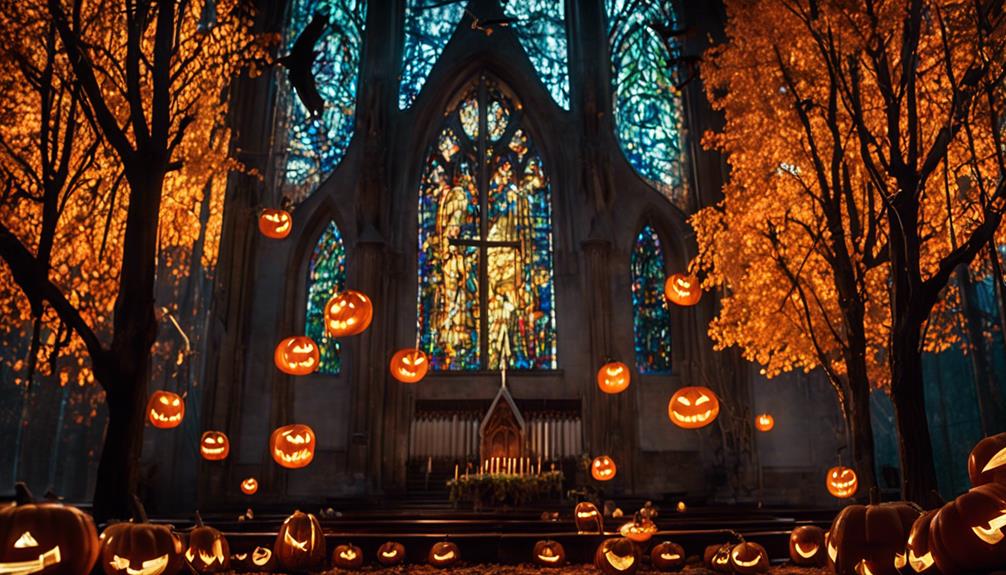
As you navigate the complexities of Halloween in Baptist church communities, it's clear that distinguishing between the sacred and secular aspects of the holiday is essential for Christians seeking to engage with their communities while upholding their faith.
By recognizing the distinction between sacred and secular, you can participate in Halloween activities that are respectful of your faith.
Some key points to bear in mind:
- Separate the cultural from the spiritual: Focus on the holiday's cultural and social significance, rather than its religious or spiritual connotations.
- Understand the history: Recognize the pagan origins and modern commercialization of Halloween, and choose to engage in activities that align with your Christian values.
- Host alternative events: Organize harvest festivals or fall celebrations that promote a positive, faith-based message and bring your community together.
- Prioritize your faith: Remember that your commitment to God and your Christian principles should guide your decisions on how to participate in Halloween activities.
Scriptural Guidance on Celebrations
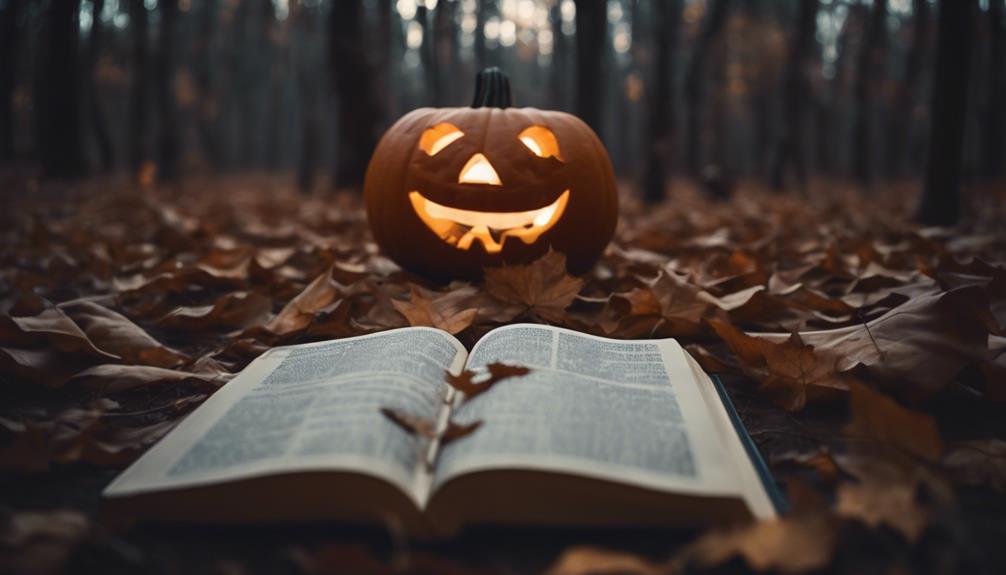
When considering Halloween celebrations, you should turn to Scripture for guidance, recognizing that the Bible provides principles to inform your decisions about participating in this holiday.
Since the Bible doesn't explicitly mention Halloween, you must rely on scriptural guidance to inform your convictions. Romans 14:5-6 reminds you to be fully convinced in your own mind about observing special days, respecting differing opinions.
As you navigate Halloween celebrations, 1 Corinthians 8:8-9 encourages you to be mindful of your actions' potential impact on others, considering their views and convictions. Galatians 5:13-14 reminds you to use your freedom in Christ responsibly, avoiding actions that may cause others to stumble and instead seeking to serve and love one another.
Colossians 2:16-17 cautions against judging others based on their participation in festivals, emphasizing the importance of focusing on things above and not on earthly matters. As you seek guidance, remember that God's love is the foundation of your decisions, encouraging you to act with love, respect, and sensitivity towards others.
Personal Convictions and Baptist Beliefs

As a Baptist, you're part of a community that values individual freedom and autonomy in matters of faith. However, this freedom is balanced by a shared commitment to certain beliefs and principles.
You'll need to weigh your personal convictions and how they align with Baptist beliefs when deciding whether to celebrate Halloween.
When evaluating Halloween celebrations, ask yourself:
- Do I believe Halloween is a pagan holiday that contradicts Baptist values?
- Do I think Halloween promotes a focus on darkness and evil, rather than light and goodness?
- Am I comfortable with the potential for Halloween celebrations to lead to occult or supernatural practices?
- Do I believe Baptist beliefs emphasize the importance of separating oneself from worldly influences, including Halloween?
Reflecting on these questions will help you clarify your personal convictions and their alignment with Baptist beliefs.
Ultimately, prayerfully ponder your motivations and the potential impact of Halloween celebrations on your faith and community.
Navigating Church Doctrine and Tradition
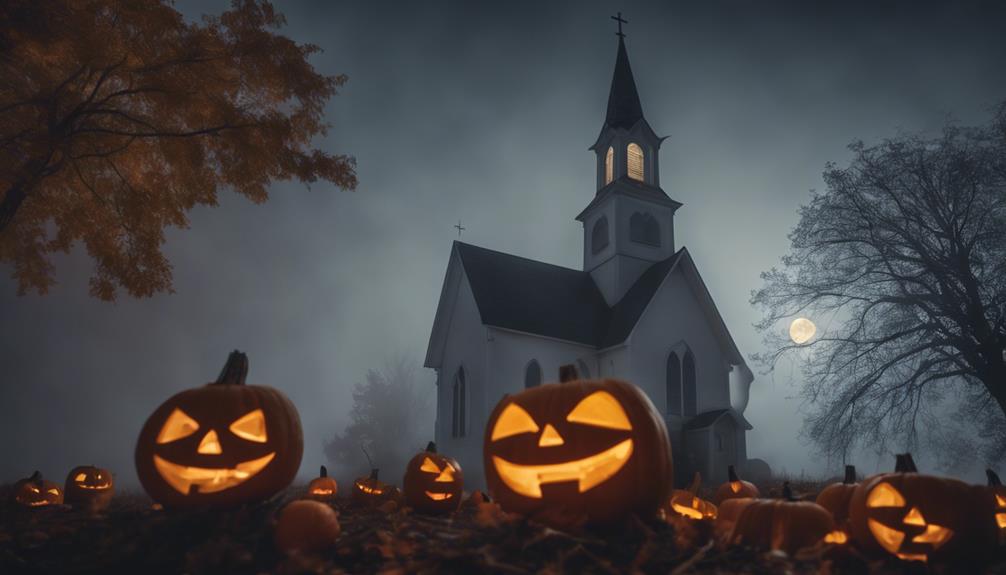
Many Baptist churches and individuals navigate the celebration of Halloween by examining church doctrine and tradition, which often shape their stance on the holiday. As you consider celebrating Halloween, you might wonder how Baptist doctrine and tradition influence the decision.
| Baptist Perspective | Halloween Celebration |
|---|---|
| Rejects Halloween | Views Halloween as pagan, focusing on darkness, evil, and the supernatural |
| Reframes Halloween | Celebrates as a harvest festival or fall celebration, distancing from pagan roots |
| Sees Evangelism Opportunity | Uses Halloween as a chance to engage with the community and share the gospel |
| Offers Alternative Celebrations | Hosts fall festivals, trunk-or-treat events, or harvest parties as a Christian alternative |
Some Baptists reject Halloween due to its perceived pagan origins, while others reframe the holiday as a harvest festival or fall celebration, distancing themselves from its pagan roots. Some Baptist churches view Halloween as an opportunity for evangelism and outreach, using the holiday as a chance to engage with their communities and share the gospel. Others may adopt alternative celebrations or events on October 31st, providing a Christian alternative to traditional Halloween celebrations.
Frequently Asked Questions
Does Baptist Church Celebrate Halloween?
Do Baptist churches celebrate Halloween? The answer is, it depends.
Some Baptist churches reject Halloween, viewing it as pagan or satanic, while others see it as a fun, secular event.
Individual churches and individuals have the freedom to decide how to approach Halloween, with some choosing to hold alternative events or use the holiday for outreach and evangelism.
What Denomination Doesn't Celebrate Halloween?
Jehovah's Witnesses, for instance, view Halloween as a pagan holiday incompatible with their Christian beliefs.
Some Orthodox Jews, Conservative Jews, and Reform Jews also don't celebrate it due to its non-Jewish origins.
Additionally, some Muslim, Buddhist, and Hindu families avoid Halloween due to religious beliefs or cultural differences.
Is It Okay for Christians to Celebrate Halloween?
You wonder if it's okay for Christians to celebrate Halloween.
The answer lies in personal conviction and interpretation.
While some Christians see Halloween as incompatible with their faith due to its pagan origins, others believe it can be celebrated in a way that honors their values.
The Bible doesn't explicitly mention Halloween, leaving the decision to participate up to individual interpretation.
Ultimately, it's a matter of personal choice and conscience.
What Religion Prohibits Halloween?
Jehovah's Witnesses prohibit Halloween celebrations due to its pagan origins and potential association with idolatry, darkness, and evil.
Some Orthodox and Conservative Jewish families also discourage or prohibit Halloween celebrations for the same reasons.
Certain Muslim denominations view Halloween as a pagan holiday that contradicts Islamic values, and therefore, they prohibit its celebration.
The Church of Jesus Christ of Latter-day Saints discourages Halloween celebrations, as they believe it promotes a focus on darkness and evil, which is contradictory to their values of light and goodness.
Conclusion
As you weigh the decision to celebrate Halloween, consider this:
Did you know that 64% of Protestant Christians, including Baptists, attend a Halloween-related event each year?
By distinguishing between sacred and secular practices, you can make an informed decision that aligns with your faith and values.
Note: The response should be without pleasantries, such as 'Here is…' or 'Here are…'.
